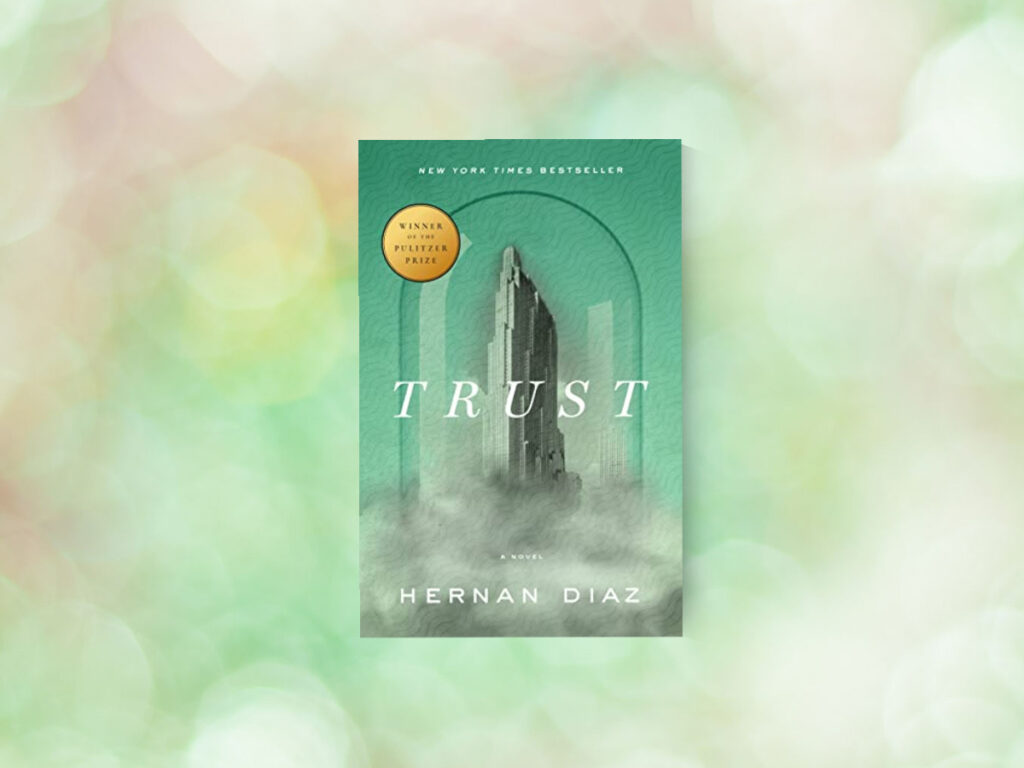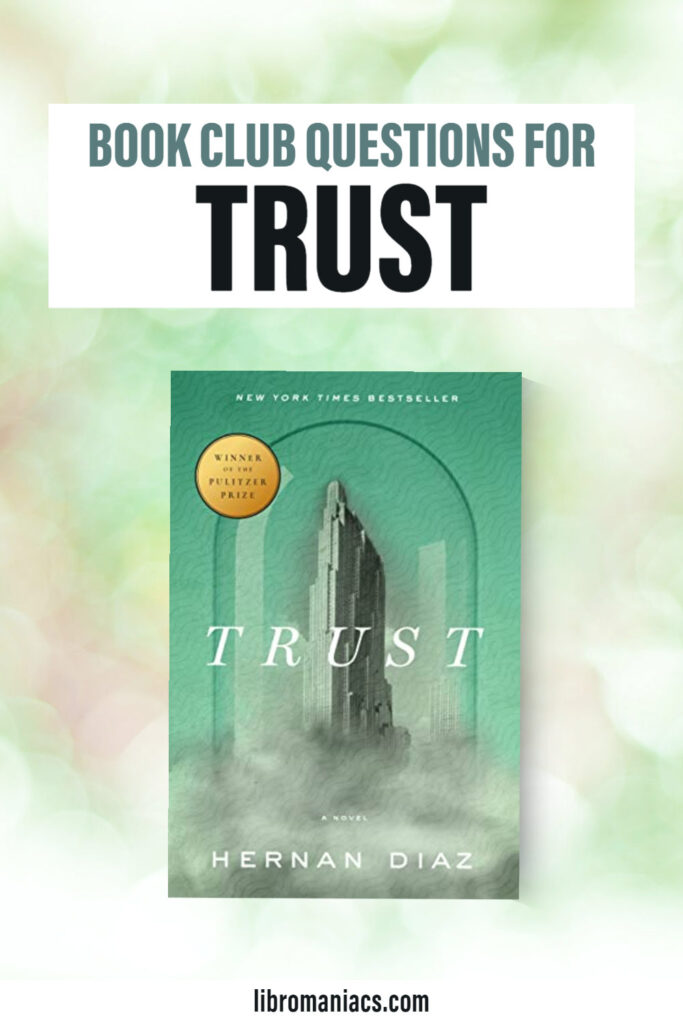What does it mean to be powerful? How does power and money shape our history and cultural identity? Hernan Diaz’s Trust explores those questions and more in his intriguing novel featuring a wealthy financier and his wife in the 1920’s. Use these Trust book club questions to explore this intricately structured novel and its exploration of the high stakes financial world, the power of storytelling, and how we determine what truth is.
This Trust discussion guide features everything you need to delve into Diaz’s Pulitzer Prize winning novel. The novel uses a unique structure to tell its story; a novel-within-the-novel, an unfinished manuscript, a memoir, and a diary. Explore the layers of this book with our Trust book club questions, and spur on more conversation with selected reviews from fellow readers.
Also included in this discussion guide is a synopsis and recommendations for three similar books for further reading.

(This article contains affiliate links. This means that if you choose to purchase, I’ll make a small commission.)
Trust Synopsis
(We always chose to provide the publisher synopsis because we feel that it’s worthwhile to discuss whether the official book description actually squared with your experience of the book.)
Trust, Hernan Diaz
Even through the roar and effervescence of the 1920s, everyone in New York has heard of Benjamin and Helen Rask. He is a legendary Wall Street tycoon; she is the daughter of eccentric aristocrats. Together, they have risen to the very top of a world of seemingly endless wealth—all as a decade of excess and speculation draws to an end. But at what cost have they acquired their immense fortune? This is the mystery at the center of Bonds, a successful 1937 novel that all of New York seems to have read. Yet there are other versions of this tale of privilege and deceit.
Hernan Diaz’s TRUST elegantly puts these competing narratives into conversation with one another—and in tension with the perspective of one woman bent on disentangling fact from fiction. The result is a novel that spans over a century and becomes more exhilarating with each new revelation.
At once an immersive story and a brilliant literary puzzle, TRUST engages the reader in a quest for the truth while confronting the deceptions that often live at the heart of personal relationships, the reality-warping force of capital, and the ease with which power can manipulate facts.
10 Trust Book Club Questions
These questions have been tailored to this book’s specific reading experience, but if you want more ideas, we also have an article with 101 generic book club questions.
- How do you feel about the structure of the book, having a short novel, partial autobiography, memoir, and diary within the book?
- Each story presents a different version of truth. How did each author bend the truth to suit their needs or perspective? Do you think any of the stories were completely honest?
- “The crash, he believed, had been a lancet applied to an abscess. A good bleeding was necessary to do away with the swelling so that the market could find its true bottom and rebuild on solid foundations.”
The story presents two starkly opposing views, the capitalist free-market view of Andrew Bevel, and the anarchist proletariat view of Ida Partenza’s father. How do their views of the great crash in the 1920’s differ? Whom do you agree with?
- “I understood I’d never be allowed to operate at such heights if it wasn’t through him. For a while, we both enjoyed this alliance. Soon, though, an imbalance became obvious: what he could teach me (nature of instruments, procedures, balance sheet analysis, etc.) was finite, while my domain was inexhaustible”
What do you think of Mildred’s revelation about her financial advice to Andrew? How did it affect their marriage, and Andrew’s later autobiography?
- Why do you think Harold Vanner portrayed the Bevels the way that he did in his fictional book Bonds? Why did he use mental illness to explain Helen’s decline and death?
- “…they all believed, without any sort of doubt, that they deserved to be heard, that their words ought to be heard, that the narratives of their faultless lives must be heard. They all had the same unwavering certainty my father had. And I understood that this was the certainty that Bevel wanted on the page.”
History is told through collections of facts and stories. How does this book show the impact of power on history making? Who has power, and how is it used to change the narrative?
- What do you think about Mildred and Andrew’s relationship? Did they truly love each other? How was their relationship impacted by the gender norms and class expectations of the time?
- How did your impression of the main characters change with each narrative? Did Mildred’s diary change your opinion of the earlier narratives?
- Why do you think that Ida decided to work for someone so completely different from her father and boyfriend? How do you think her experience of working with Andrew changed her?
- “My job is about being right. Always. If I’m ever wrong, I must make use of all my means and resources to bend and align reality according to my mistake so that it ceases to be a mistake.”
What do you think about Andrew and how he wields his power?
Selected Reviews for Trust
“With its unique structure, elegant writing, interesting characters (even the immensely unlikable protagonist) and the 1920s setting, Hernan Diaz’s Trust is a sharp, compelling and creative work of fiction. The first part of the novel does not quite give the reader an idea of the complexity and the intrigue of the plot that lies ahead. The final two parts of the novel were my favorite and the most absorbing part(s) of the book.”
“…there were passages I enjoyed reading (especially in part three), but the overall narrative idea is way more appealing than the execution. I was missing deeper insights on the belief systems tackled here – unrestrained capitalism, Marxism, Italian anarchism – or the sociopolitical context, or at least the finance system as such. The characters themselves are rendered as ciphers, which is not a problem per se, but then they really have to stand for something complex…”
“Trust is not necessarily invested in providing all the answers; by the end of the novel, we don’t so much land somewhere as just keep falling. What Trust offers us instead is a plurality of narratives that chart the complexity of our lives and seek to represent the true face of our history. It’s an invitation to reject—or at the very least be skeptical of—the authority of all-encompassing narratives, and to always look for the stories trapped underneath, or otherwise shoved to the ill-lit margins. Trust is an exercise, ultimately, in excavating truth, wherever it’s hidden. To do the opposite of what the title tempts us to do, which is to say—to trust.”
“…This book is very smart in how it engages with patriarchy and misogyny, showing us not just the wealthy exploiting the work and care of women. It also uses the voices of men and, ultimately, women as well. The echo of a man telling a woman’s story put up against the work women do to tell men’s stories bounce back and forth off each other like two mirrors held parallel.” I was so satisfied by the end, this is exactly the kind of interesting writing that I have been wanting but mostly not getting from men writing literary fiction…”
3 Books Like Trust
We have some other discussion quides for books set in the Golden Age including: The Personal Librarian, The Lion’s of Fifth Avenue and The Magnificent Lives of Marjorie Post.

The Great Gatsby, F. Scott Fitzgerald
Perhaps it’s time for a re-read of The Great Gatsby. It’s an enduring classic set in the 1920’s, The Great Gatsby is an excellent next read if you’d like to read more about upper class society in this era.
The book follows the fabulously wealthy Jay Gatsby, who is in love with the beautiful Daisy Buchanan. With elegant prose, the reader is drawn into their luxurious but not always fulfilling lives.

Trust Exercise, Susan Choi
This is an excellent choice for another novel that plays with structure in order to examine the stories we tell ourselves, and questions what is really the truth.
Choi’s novel focuses on a high school drama department, and the relationship between two students, Sarah and David. Their teacher Mr. Kinglsey enjoys toying with students and their personal dramas, and a twist in the book leads the reader to question what is the truth, and who’s perspective really matters.

The Great Crash 1929, John Kenneth Galbraith
If you are looking to learn more about the stock market crash of 1929 and the reality surrounding it, The Great Crash 1929 is a great choice. In this non-fiction book, Galbraith uses an engaging and witty writing style to examine American culture before the crash, reasons for the crash, and to break down myths surrounding that time period and the ‘experts’ involved.
Have a listen on Audible. Try audio books for free for 30 days.
Share these Trust book club questions with your friends:

